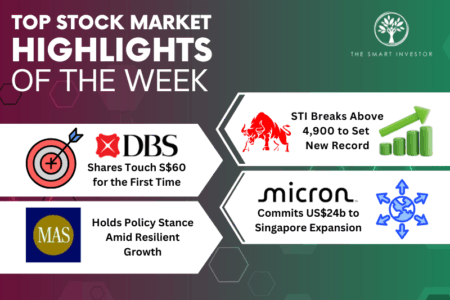Welcome to this week’s edition of top stock market highlights.
OpenAI
OpenAI, the company behind the famous generative artificial intelligence (AI) software ChatGPT, recently completed a deal to raise US$6.6 billion in new funding.
After this round of funding, the AI company is now valued at US$157 billion.
Thrive Capital, a venture capital firm headed by Josh Kushner, led this round’s funding by injecting US$1.3 billion.
Microsoft (NASDAQ: MSFT), OpenAI’s largest backer, pumped in around US$750 million this time, adding to the US$13 billion the software company had already injected into the start-up.
Other prominent investors included Khosla Ventures, Fidelity Management & Research, and Nvidia (NASDAQ: NVDA).
This deal makes OpenAI one of the three largest venture-backed start ups and puts it at the top of the league alongside Elon Musk’s SpaceX and TikTok’s ByteDance.
Other investors include Tiger Global Management and Altimeter Capital which injected US$350 million and US$250 million, respectively.
OpenAI expects to generate more than US$10 billion in revenue next year even as it prepares to eventually go public.
An IPO will be the “logical next step” for the company seeing that its technology makes it one of the most important AI companies in the world aside from Nvidia.
Apple (NASDAQ: AAPL) did not participate in this deal although the iPhone maker has a partnership with OpenAI to integrate the latter’s ChatGPT into its devices.
OpenAI is also transitioning to a “for-profit” model but this could pose legal problems even as it is in discussion with CEO Sam Altman to award him an equity stake in the company possibly worth more than US$10 billion.
Though OpenAI is still a popular choice for its generative AI software, other companies have sprung up in the last two years to challenge its dominance.
Anthropic and Safe Superintelligence were started by former OpenAI employees that could give the market leader a run for its money.
Both Alphabet (NASDAQ: GOOGL) and Amazon (NASDAQ: AMZN), which have considerable financial resources, are also developing their own AI models that could challenge OpenAI.
CapitaLand Ascott Trust (SGX: HMN)
CapitaLand Ascott Trust, or CLAS, entered an agreement with Ascott Serviced Residence Global Fund to acquire lyf Funan Singapore for S$263 million.
This acquisition will be funded by the proceeds from the divestment of Citadines Mount Sophia Singapore which was divested at an EBITDA (earnings before interest, taxes, depreciation and amortisation) yield of 3.2%.
CLAS’s acquisition yield of lyf Funan Singapore was 4.7% and will increase the hospitality trust’s distribution per stapled security (DPSS) by 1.5% for 2023’s DPSS.
After the acquisition is completed, CLAS will enter into a master lease agreement with The Ascott fo lyf Funan Singapore.
CLAS will hold an extraordinary general meeting for unitholders to vote on both these corporate moves and if approved, the transaction should be completed in the fourth quarter of this year.
Lyf Funan Singapore is a 329-room hotel built in 2019 with a gross floor area of 11,347 square metres.
Post-acquisition, CLAS’s aggregate leverage is expected to be 39.1% and below the 40% threshold.
This acquisition will increase CLAS’s proportion of total assets in Singapore from 16% to 19%.
The asset also offers the flexibility to cater to either short or extended stays and achieved a strong average occupancy rate of above 80%.
China’s stock rally
A sharp rally in Chinese stocks is causing many investors to pull money out of Asia and into China.
Countries such as South Korea, Indonesia, Malaysia, and Thailand posted net outflows last week as Beijing unleased a stimulus blitz.
Many fund managers were caught on the back pedal as China’s stock markets roared back to life after an extended period of disappointment.
The strength of the rally is staggering.
The MSCI China Index has leapt more than 30% from its low as Chinese authorities unveiled a raft of measures to stimulate economic growth.
Investors are also enticed by attractive valuations with the MSCI China Index trading at just 10.8 times forward earnings, below its five-year average of 11.7 times.
Global mutual funds had just a 5% allocation to China, the lowest in over a decade, making a good case for these funds to increase their allocations to capture the rally.
The momentum-based rally is sucking money from mutual and hedge funds, which will help to further fuel the rally in what Beijing hopes will be a self-reinforcing cycle that will lift the country’s fortunes and spur companies and individuals to spend more.
Want more dividends in 2024? Our latest FREE report spotlights five Singapore REITs with distribution yields of 5.5% or more, a rare find in today’s market. These are reliable, proven performers. Just one stock inside could boost your portfolio’s returns in the next few months. Download your report today and start reaping the benefits.
Follow us on Facebook and Telegram for the latest investing news and analyses!
Disclosure: Royston Yang owns shares of Apple and Alphabet.





